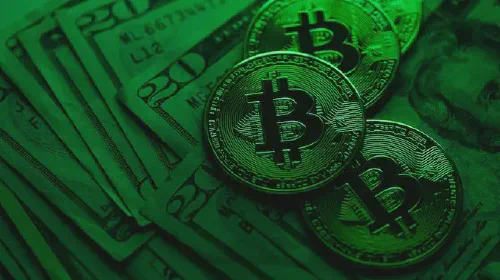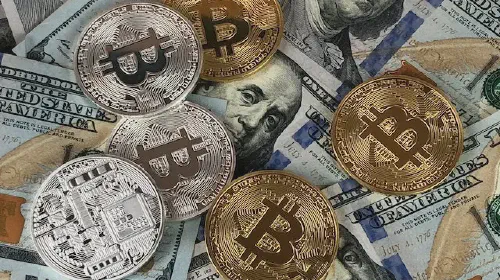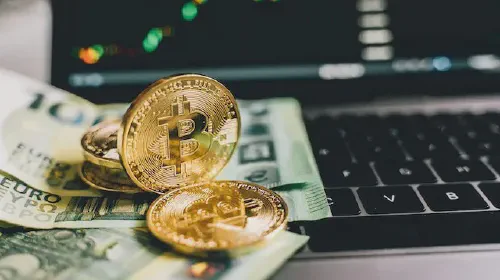Bitcoin Cash: Creation, Features, and Adoption
Salomon Kisters
Dec 27, 2022This post may contain affiliate links. If you use these links to buy something we may earn a commission. Thanks!
Bitcoin Cash was created in 2017 as a result of a hard fork of Bitcoin.
The goal was to increase the block size from 1 megabyte to 8 megabytes, a move that was designed to make the cryptocurrency more attractive to merchants and users. This larger block size was intended to allow for faster transaction times and lower fees, as well as increased scalability.
As a result, Bitcoin Cash became one of the most popular cryptocurrencies, and it is now the twenty-sixth largest crypto by market capitalization today.
Bitcoin Cash allows users to send and receive payments using any currency, including fiat currencies. This makes it an ideal platform for global payments, as users can use it to pay for goods and services in their local currency. With all of these features, it’s no wonder Bitcoin Cash has become so popular.
The Bitcoin Cash Story: Transactional Cryptocurrency for Everyday Use
Contrary to the common belief, Bitcoin Cash is not the cash version of Bitcoin.
Despite having almost the same working mechanism as Bitcoin, Bitcoin Cash is, in fact, a separate cryptocurrency.
As mentioned, it was created as a result of a hard fork in the Bitcoin blockchain. The Bitcoin community was split into two groups due to disagreement on some of the technical features Bitcoin had at the time.
Why was Bitcoin Cash Introduced?
Back in 2009, when Bitcoin was created, Satoshi Nakamoto determined the size of each block of the blockchain, i.e., a few hundred Kilo Bytes. After that, Bitcoin went through several updates, and the block size was increased to 1 MB.
Due to its growing popularity and a steady rise in users, Bitcoin eventually reached a point where it was no longer feasible to support the growing daily transactions without some modification. The high traffic led to a high transaction fee and delayed completion time.
Some Bitcoin developers recognized the problem early and proposed to increase the size of blocks to improve transaction speeds and lower the transaction fee.
However, the suggestion was met with strong disapproval from the rest of the Bitcoin community. They instead suggested implementing SegWit to solve the problems.
Hence, the former group of miners went on to introduce a Bitcoin hard fork, which resulted in the creation of Bitcoin Cash, an entirely new cryptocurrency using the same technology as Bitcoin. This new cryptocurrency had a block size of 8 MB.
What Problems Does Bitcoin Cash Solve?
The smaller block size of Bitcoin caused considerable delays in transactions. At one point in time, it took more than 20 minutes to confirm one transaction on Bitcoin. A 1 MB block could store records of just a few transactions. On top of that, it took considerable time to create a single Bitcoin block.
The 8 MB block size, on the other hand, provided room for much more transactions per block. Transaction speed increased exponentially, which meant that the transactions started getting approved almost instantly, taking barely a second.
Another problem that Bitcoin faced initially was high transaction fees. Like many other cryptocurrencies, Bitcoin does not have a fixed transaction speed. Instead, the fee depends on the on-chain traffic. Consequently, the transaction fees are pushed higher during high congestion or peak hours.
For instance, in April 2021, the fee peaked at USD60 per transaction. Bigger block size in Bitcoin cash, therefore, helped reduce the transaction fee to a few cents only.
More recently, the Bitcoin community has started claiming that Bitcoin has gone off course from its original purpose as a decentralized peer-to-peer payment system. Due to its incredibly large market cap and high price per token, Bitcoin has reached the status of a store-for-value token.
On the other hand, Bitcoin Cash (BCH) can be used for daily peer-to-peer payments.
Founding Team
The founding team of the Bitcoin Cash project consisted of some Bitcoin developers who worked under the supervision of Haipo Yang – CEO of ViaBTC and one of the earliest investors in BTC. Since its early days, Bitcoin Cash has been supported by Roger Ver – CEO of Bitcoin.com.
Ver is also one of the early adopters of Bitcoin and is often referred to as the “Bitcoin Jesus.” He believes that the original purpose of Bitcoin (providing a decentralized peer-to-peer transaction platform) is now being fulfilled by Bitcoin Cash.
How Bitcoin Cash Works
As mentioned before, Bitcoin Cash works on similar technology as Bitcoin itself.
Therefore, the working mechanism is based on the Proof-of-Work algorithm. Bitcoin was the first cryptocurrency that used this consensus mechanism to validate transactions. Since then, numerous blockchains and cryptocurrencies have implemented the same on their own platforms.
To create a new block in a Proof-of-Work mechanism, all the nodes on the network compete against each other to solve a complex mathematical problem. When one node successfully solves the puzzle, it is then given the opportunity to verify transactions and create a new block.
After that, it is rewarded with a specific number of crypto tokens. This process of solving the puzzles and creating new blocks is referred to as cryptographic mining.
Miners use top-end technology to solve the puzzle, which, in turn, consumes a lot of energy. The ability to solve the puzzle is called hash power. The difficulty level of mathematical problems increases if more hash power is added to the network, resulting in a secure transaction system.
Problems with Bitcoin Cash
Despite faster transaction speeds and lower transaction fees, which seems ideal for a peer-to-peer transaction network, larger block size introduced more problems. Bitcoin cash developers tend to ignore that a normal user may want to participate in the network by setting up an independent node.
Bigger block size makes the mining process more complicated for ordinary machines. Shortly after the inception of Bitcoin Cash, its size was further increased to 32 MB per block. Mining a 32 MB block is almost impossible for a modest machine.
This meant that only computers with high hash power can now participate in mining Bitcoin Cash. As a result, only big corporations or individuals with significant capital could afford to invest in mining computers and setting up nodes.
This goes against the core principle of Bitcoin, i.e., to establish a “decentralized” and “fair” payment system. If the majority of the network nodes are owned and controlled by big companies and a handful of big miners, the very decentralization of the platform is compromised.
The big players can potentially make all the decisions they want, including verifying the transactions and technical updates. It also compromises the security of the entire blockchain as it gives more opportunities to attackers to essentially control Bitcoin Cash by combining the hash power.
On top of all that, smaller transactions have sometimes been reported to get processed even before the block was confirmed due to the bigger block size. This increases the risk of false processing transactions, a red alert for everyday users.
Tokenomics
Like BTC, the maximum market cap of BCH is 21 million. 91.74% of the total BCH tokens have been mined by the time of writing this article. Only 1.73 million tokens are left to be mined. The current circulating supply is over 19 million tokens with a market cap of $1.9 billion.
Moreover, the BCH block mining reward is also halved every four years. The last halving occurred on April 8, 2020. After that, miners are rewarded with 6.25 BCH for every block they create. The next halving is expected to occur in January 2024, reducing the mining reward to 3.125 BCH per block.
Adoption
Despite all the controversies that Bitcoin Cash has attracted, it is still considered one of the most popular cryptocurrencies in the world. So far, big companies like Newegg, Twitch, Jomashop, Namecheap, and CyberGhost VPN accept Bitcoin Cash for different purposes.
For example, Twitch, an online platform for streamers, allows users to donate to their favorite content creators using Bitcoin Cash.
As of 2022, according to Coin Carp, there are 17.1 million Bitcoin Cash holders, and the top 10 wallets have 11.12% of the total volume. The wallet with the highest number of BCH has 893,949 BCH, which is 4.26% of the total volume of BCH.
Where Can You Buy Bitcoin Cash
Bitcoin Cash is listed in 49 crypto exchanges, including CoinBase, Gemini, Kraken, Coinex, and Binance. These crypto exchanges allow you to buy Bitcoin Cash using different fiat currencies and cryptocurrencies.
For example, if you choose Binance:
- You need to download the Binance App or visit the Binance desktop website.
- Make your account using your phone number and email address.
- Before performing any transactions, you need to submit your official documentation to verify your identity.
- Fund your account using one of the available deposit methods, such as a credit/debit card or bank transfer. The platform also allows you to purchase cryptocurrency via P2P transfer.
- Once you have funded your account, you can proceed to the trading interface and search for the intended trading pair, such as BCH/USD, BCH/BTC, or BCH/ETH.
- After entering the amount you wish to purchase, proceed with the transaction. Moments afterward, you will receive Bitcoin Cash tokens in your wallet.
Final thoughts
Bitcoin Cash is one of the most promising cryptocurrencies of the 21st century. The future of Bitcoin Cash looks bright as more and more people turn to it as an alternative to traditional payment methods.
Bitcoin Cash is also becoming more accessible, with more and more exchanges offering it as a trading option. This means that people can easily buy, sell, and trade the currency. With the increasing demand for Bitcoin Cash, developers are continually finding new ways to use the technology.
Projects like the Lightning Network are making it possible for people to send and receive payments instantly. There is also a push for wider merchant adoption, allowing businesses to accept Bitcoin Cash as payment.
All of this indicates that Bitcoin Cash will only continue to grow and become more widely used in the years to come.
Stay informed with the latest insights in Crypto, Blockchain, and Cyber-Security! Subscribe to our newsletter now to receive exclusive updates, expert analyses, and current developments directly to your inbox. Don't miss the opportunity to expand your knowledge and stay up-to-date.
Love what you're reading? Subscribe for top stories in Crypto, Blockchain, and Cyber-Security. Stay informed with exclusive updates.
Please note that the Content may have been generated with the Help of AI. The editorial content of OriginStamp AG does not constitute a recommendation for investment or purchase advice. In principle, an investment can also lead to a total loss. Therefore, please seek advice before making an investment decision.

Bitcoin Scaling Problem: Causes and Solutions | Comprehensive Guide
Learn about the causes of Bitcoin's scaling problem and explore various solutions to enhance transaction speed and efficiency on the Bitcoin network.

5 Ways to Buy Bitcoin for Cash
In this article, we will explain exactly how to buy Bitcoin for cash.

Understanding the Special Features of Bitcoin: Limited Supply, Decentralized Transactions, Security, and Global Accessibility
Explore the unique features of Bitcoin, including limited supply, decentralized transactions, security, and global accessibility. Learn why Bitcoin is a groundbreaking digital asset.
Protect your documents
Your gateway to unforgeable data. Imprint the authenticity of your information with our blockchain timestamp